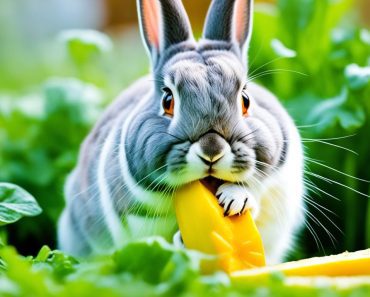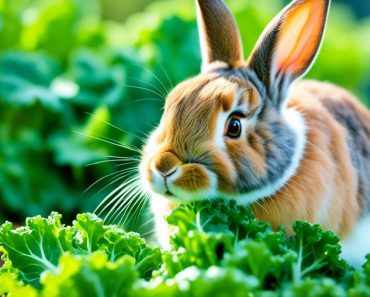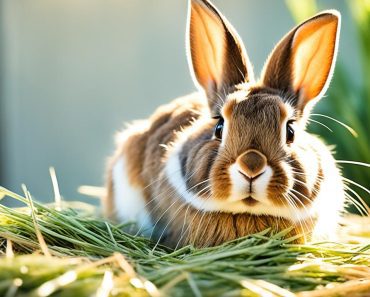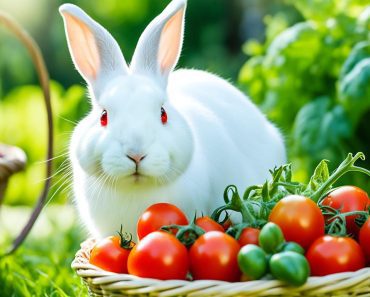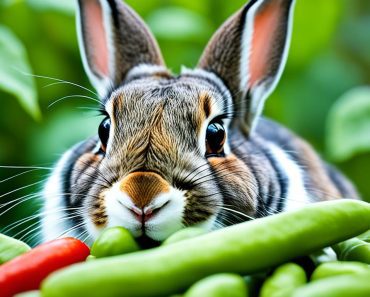As a responsible rabbit owner, it’s important to know which foods are safe for your furry friend. One commonly asked question is, can rabbits eat plums? The answer is yes, but with some important considerations.
Feeding plums to rabbits can provide them with certain health benefits. Plums are rich in vitamins C, A, and K, as well as minerals like manganese, copper, and potassium. These nutrients contribute to the overall wellbeing of rabbits. However, it’s crucial to remember that moderation is key.
Due to the high sugar content in plums, they should be given in small amounts as part of a balanced diet. It’s important to consider your rabbit’s overall fruit intake and not exceed the recommended amount. Overindulgence in plums can lead to digestive issues and potentially disrupt your rabbit’s health. It’s best to use plums as occasional treats.
When feeding plums to your rabbit, ensure that you remove the stones before offering the fruit. Plum stones contain cyanide and can be toxic to rabbits. Moreover, they pose a choking hazard. Always wash plums before feeding them to your rabbit and leave the skins intact, as they provide additional nutrients.
Can Rabbits Eat Plums? Yes, they can. As long as it’s properly prepared.
- Plums are safe for rabbits to eat, but in moderation.
- They offer vitamins C, A, and K, as well as minerals like manganese, copper, and potassium.
- Plums should be given in small amounts due to their high sugar content.
- Remove the stones before feeding plums to your rabbit to avoid toxicity and choking hazards.
- Wash plums and leave the skins intact to provide additional nutrients.
Health Benefits of Plums for Rabbits
Plums offer various health benefits to rabbits. They are a source of vitamins C, A, and K, as well as essential minerals like manganese, copper, and potassium. These nutrients contribute to the overall well-being of rabbits. Plums also contain fiber, which is crucial for rabbits’ digestive health.
The skins of plums are particularly rich in fiber and should be included when feeding them to rabbits. Fiber helps regulate the digestive system, prevents constipation, and promotes healthy gut bacteria. Including the skin of the plum provides additional nutrients and aids in maintaining a healthy digestive tract for rabbits.
Rabbits require a balanced diet to thrive, and plums can be a beneficial addition. However, due to the high sugar content in plums, they should be given in moderation. Excessive sugar intake can lead to weight gain, dental issues, and digestive problems in rabbits. It is important to offer plums as a treat and not as a staple food in their diet.
“Including plums in a rabbit’s diet can provide essential vitamins, minerals, and fiber that contribute to their overall health and well-being.”
To prevent any digestive issues, it is recommended to introduce plums gradually into a rabbit’s diet. Start with small amounts and monitor their response. If there are no adverse reactions, you can continue incorporating plums into their diet a couple of times a week, ensuring that they receive a varied and balanced selection of fruits and vegetables.
Remember that each rabbit is unique, and their dietary requirements can vary. Always consult with a veterinarian for specific feeding recommendations and to ensure that plums and other fruits and vegetables are suitable for your rabbit’s individual needs.
Vitamins in Plums for Rabbits
- Vitamin C: Supports the immune system and helps with a rabbit’s overall health.
- Vitamin A: Important for maintaining healthy vision and supporting the growth and development of rabbits.
- Vitamin K: Helps with blood clotting and bone health in rabbits.
Minerals in Plums for Rabbits
- Manganese: Essential for the metabolism of carbohydrates, proteins, and fats in rabbits.
- Copper: Plays a role in maintaining healthy connective tissues, energy production, and antioxidant functions in rabbits.
- Potassium: Helps regulate fluid balance, muscle contractions, and nerve signals in rabbits.
Fiber in Plums for Rabbits
Fiber is crucial for a rabbit’s digestive health as it helps prevent gastrointestinal stasis, a potentially life-threatening condition. Including the skin of plums when feeding them to rabbits ensures they receive an adequate amount of fiber in their diet. Fiber promotes healthy digestion and contributes to a balanced gut microbiome in rabbits.
How Much Plum Can Rabbits Have?
Rabbits should only have a small amount of plum as part of their diet. It is important to consider the rabbit’s overall fruit intake and practice portion control when feeding plums to rabbits. The recommended plum intake for rabbits is a couple of teaspoons of fruit a couple of times a week.
However, smaller rabbits should be given slightly less plum, and rabbits with weight problems should not be given any fruit until they reach a healthy weight again. By practicing portion control and following the recommended serving size, you can ensure that rabbits enjoy the benefits of plums without risking digestive issues, kidney problems, or the risk of diabetes.
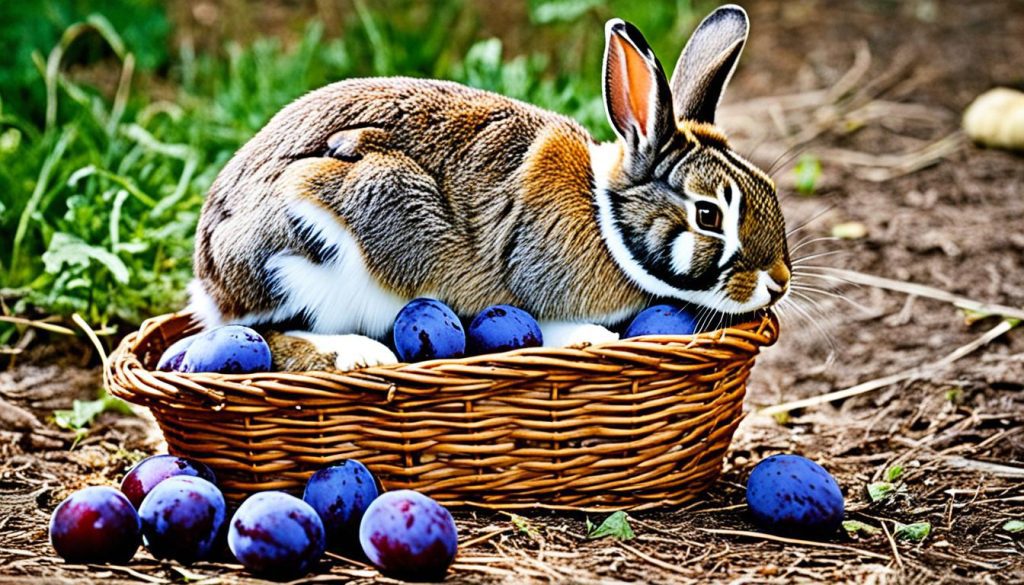
Portion Control for Rabbits and Plums
When it comes to feeding plums to rabbits, portion control is key. Rabbits have sensitive digestive systems, and consuming too much fruit, including plums, can lead to digestive issues such as diarrhea or upset stomach. It is crucial to limit the serving size of plums to avoid overfeeding the rabbit with excessive sugar and potentially harmful substances.
“The recommended portion of plum for rabbits is a couple of teaspoons of fruit a couple of times a week. Smaller rabbits should have slightly less, and rabbits with weight problems should not be given fruit until they reach a healthy weight again.”
How Often Can Rabbits Eat Plums?
Rabbits can eat plums a couple of times a week as part of their varied diet. The key is to offer plums in moderation and rotate them with other safe fruits and vegetables to ensure a balanced nutritional intake. This approach helps prevent rabbits from consuming too much sugar and maintains their overall health.
Plum Serving Size for Rabbits
The serving size of plums for rabbits should be small to prevent any adverse health effects. Aim to provide a couple of teaspoons of plum fruit each time you feed it to your rabbit. Remember to adjust the serving size based on the rabbit’s size, weight, and any specific dietary requirements. By monitoring the rabbit’s overall fruit intake and practicing portion control, you can maintain a healthy balance in its diet.
Why Can’t Rabbits Eat Plum Stones?
Plum stones should not be given to rabbits as they contain a small amount of cyanide, which can be toxic to rabbits. While one plum stone is unlikely to be dangerous, it is best to avoid giving them to rabbits altogether. Plum stones can also pose a choking hazard and potentially hurt the rabbit’s mouth if they splinter. It’s important to keep plum stones out of reach of rabbits and not offer them as chew toys.
To illustrate the dangers of plum stones for rabbits, let’s take a closer look at the presence of cyanide in them. Cyanide is a toxic substance that can be found in various plants, including plum stones. When rabbits ingest plum stones, the cyanide can be released into their bodies, causing potential harm.
The Dangers of Cyanide in Plum Stones
Cyanide is a highly toxic compound that can interfere with the body’s ability to use oxygen properly. When rabbits consume plum stones, the cyanide can disrupt their cellular respiration and lead to serious health issues or even death. This is why it is crucial to prevent rabbits from accessing plum stones or accidentally ingesting them.
In addition to the potential toxicity, plum stones can also pose a choking hazard for rabbits. Rabbits have a tendency to chew on objects, and if a plum stone gets stuck in their throat, it can cause respiratory distress and be life-threatening. Therefore, it is essential to keep plum stones out of their reach and provide them with safe and appropriate chew toys instead.
How to Prepare Plums for Rabbits
When serving plums to rabbits, it is important to take the proper steps to prepare them. Here are some tips on how to get your plums rabbit-ready:
- First, wash the plums thoroughly to remove any dirt or debris from the outside. This will ensure that the fruit is clean and safe for your rabbit to eat.
- When washing the plums, use cool water and gently scrub the surface to remove any impurities. Avoid using any soaps, detergents, or chemicals as they can be harmful to rabbits.
- It is not necessary to peel the skins off the plums. In fact, the skins provide additional nutrients and fiber that are beneficial to your rabbit’s health.
- To serve the plums, you can slice off a small section and place it in your rabbit’s bowl. Depending on the size of your rabbit and the serving size, you can cut the plum into smaller pieces to make it easier for your rabbit to eat.
- Remember to remove the plum stones before feeding them to your rabbit. Plum stones are unsafe for rabbits as they contain cyanide and can pose a choking hazard. Always double-check to ensure that no stones are left before offering the plum to your furry friend.
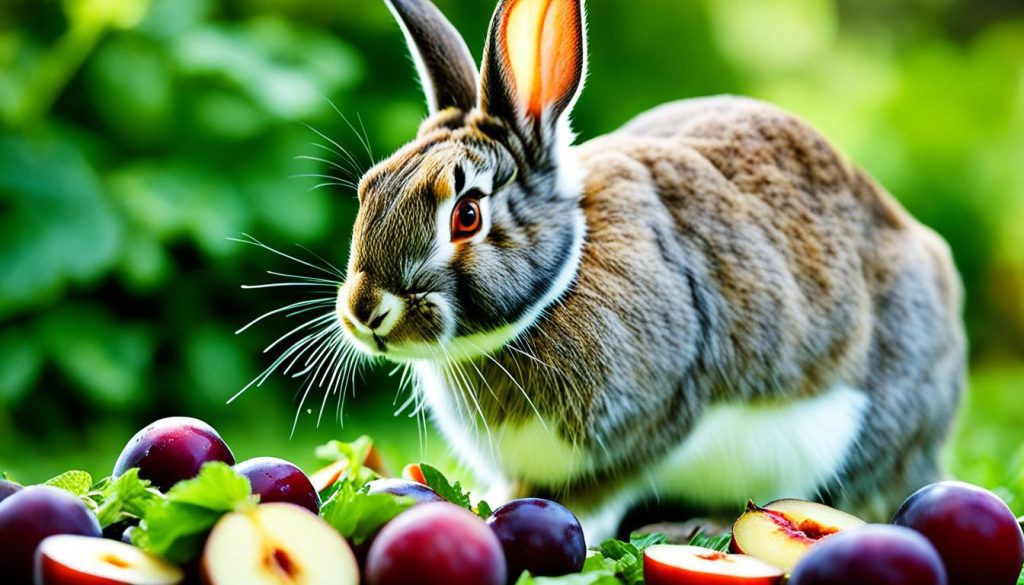
Introducing new foods to your rabbit’s diet should be done gradually. Start with a small amount of plum and observe your rabbit for any adverse reactions. If your rabbit tolerates the plum well, you can incorporate it into their diet a couple of times a week, keeping the serving size in moderation. It’s important to monitor your rabbit’s overall fruit intake and consult your veterinarian if you have any concerns.
How to Determine If Your Rabbit Likes Plums
To find out if your rabbit likes plums, wash a plum and slice off a small amount with the skin intact. Place the piece of plum in the rabbit’s pen and observe its behavior and droppings over the next few days.
If the rabbit shows any signs of lethargy, loss of appetite, diarrhea, or constipation, it may be reacting badly to plums. In such cases, it’s best to stop feeding plums and consult a vet.
However, if the rabbit shows no adverse reactions, you can slowly incorporate plum into its diet a couple of times a week.
Remember, each rabbit is unique, and their taste preferences may vary. Patience is essential when introducing new foods to your rabbit’s diet.
Conclusion
Incorporating plums into a rabbit’s diet can be a safe and nutritious choice, as long as certain precautions are taken. It is important to feed plums to rabbits in moderation, considering the high sugar content of the fruit. Additionally, removing the plum stones is crucial to prevent any potential hazards, such as choking or cyanide poisoning.
By following the recommended portion size and monitoring your rabbit’s overall fruit intake, you can provide them with the health benefits of plums without compromising their well-being. Remember to observe any adverse reactions and adjust the serving size accordingly to ensure your rabbit’s digestive health and overall happiness.
While plums offer vitamins, minerals, and fiber that are beneficial to rabbits, it is always a good idea to consult a vet if you have any concerns or notice unusual symptoms in your furry friend. With proper preparation and careful observation, you can safely introduce plums to your rabbit’s diet, allowing them to enjoy this tasty treat while keeping them healthy.

